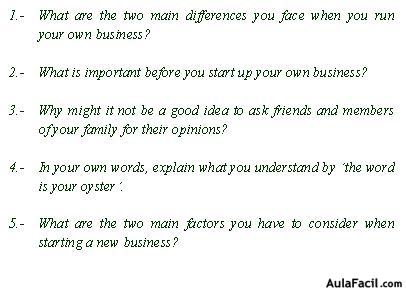Reading - You and your ideas
You and your ideas

As a way of earning a living, running your own business has two distinctive features. The first is that you do not submit yourself to a selection process; there is not, as there is with a job as an employee, a sifting carried out of possible applicants for a vacancy. There is no personnel manager wielding a battery of psychological tests or cunning interview questions to test your suitability for the job or the level of skills you have acquired.
You are the sole arbiter of your fitness to start and run your own business. This puts a very heavy responsibility on your self-knowledge, because without a doubt not everyone is suited to being an entrepreneur or being self employed. The only external check, which may be carried out on your fitness to found a business, occurs if you need to raise money; in this case, a bank manager or other lender or investor judges you. But by the time you reach this stage, you may already have committed time and money to your project.
The answer to the dilemma of this self-selection process is self-analysis: know thyself. Additional insight can be provided by the opinion of colleagues, friends or family. But this can be fraught with emotional problems. Those you ask for an opinion may feel under pressure to give a favourable view for fear of offending. If an unbiased view cannot be expected, do not seek an opinion at all.
The second unusual characteristic of starting your own business to create your own income is that you decide what type of business it is and what market you will be selling to. While you can select a salaried job in a firm of a particular or selling to a particular market, you are restricted by the vacancies that are available.
When it comes to establishing a business, in theory, the world is your oyster. A well-run business should succeed in any market. In practice, however, you can make success more likely by choosing your product and market carefully.
(Extract taken from: Small Business Guide, Sara Williams, Penguin Books, Scotland 2001)
Questions
(Haga doble click sobre las preguntas para ver las respuestas; un click vuelve a posición original)


